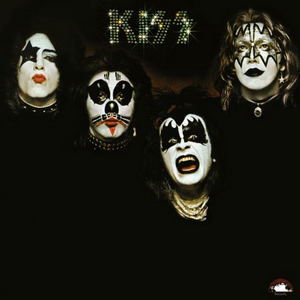By this time the boys had changed their names to the more rockin’ Paul Stanley and Gene Simmons. Guitarist Paul Frehley gladly went by Ace so there wouldn’t be two Pauls in the band, and drummer Peter Criss had already truncated his surname from Criscuola, so all they needed now—naturally—were personas to go with their carefully manufactured images. The uniform suits and nicknames (the quiet one, the cute one) ascribed to another fab foursome wouldn’t be enough for these guys. Each member of Kiss (sometimes rendered in all caps, but we’re not going to do that) would wear distinctive makeup and costumes befitting their “characters”. Elaborate stage performances with as much pyrotechnics and comic book shock level that could fit into whatever venue they were playing became just as important as the music they made.
And what of the music they made? As demonstrated on their eponymous debut, the emphasis is on heavy riffs, not exactly metal, but harder than glam. (And what makes those riffs so distinctive? The guitars are tuned down a half-step.) The lyrics are basic, easily grasped by any suburban white kid hoping to find a woman who’d give him a deuce, whatever that was, drink cold gin with him, or do it somewhere even less comfortable than the back of a Volkswagen.
Track by track the songs are solid. “Strutter”, “Nothin’ To Lose”, “Firehouse”, “Cold Gin”, “Deuce”, and “100,000 Years” all deliver hooks upon hooks, all in E or A, and while “Let Me Know” isn’t as exciting, a harmonized a cappella breakdown before a raveup and fade is a clever touch. Our personal favorite is the instrumental “Love Theme From Kiss”, which is just a terrific title. “Black Diamond” is the album’s equivalent of an epic, starting with an acoustic intro with a sensitive vocal, plowing through over the riff, slowing down the chords for another Ace solo and ending on a single A chord, repeated and slowed down over two full minutes.
It’s suggested that lengthening this tune, along with adding more silence between tracks, was done to push the album over the half-hour mark. Then, in a rare case of Kiss doing something they didn’t want to do, an oldie called “Kissin’ Time” was given new lyrics and a Kissified arrangement and released as a single in the label’s attempt to boost sales. It’s fairly embarrassing, except for Ace’s solo, which almost justifies its being stuck at the top of side two in all but the album’s first pressings, and it remains there in the CD sequence as well.
Rock ‘n roll is supposed to be fun, and a little stupid, and Kiss fit the bill. The album is simply loaded with catchy tunes, and while it took a while for people to notice, these guys were on their way to notoriety, in all senses of the word.
Kiss Kiss (1974)—4

No comments:
Post a Comment